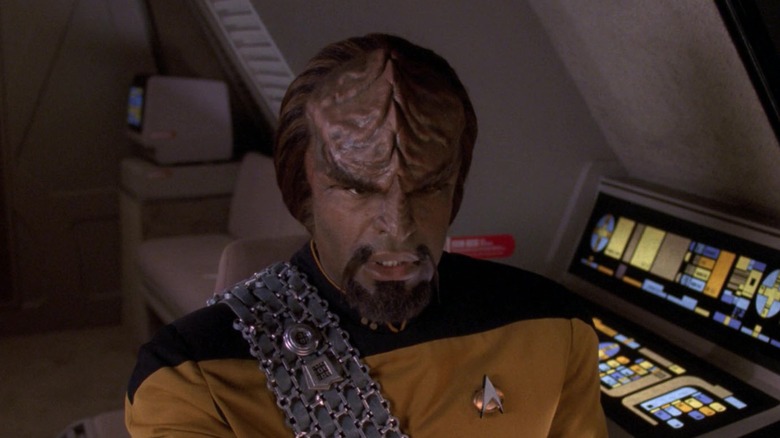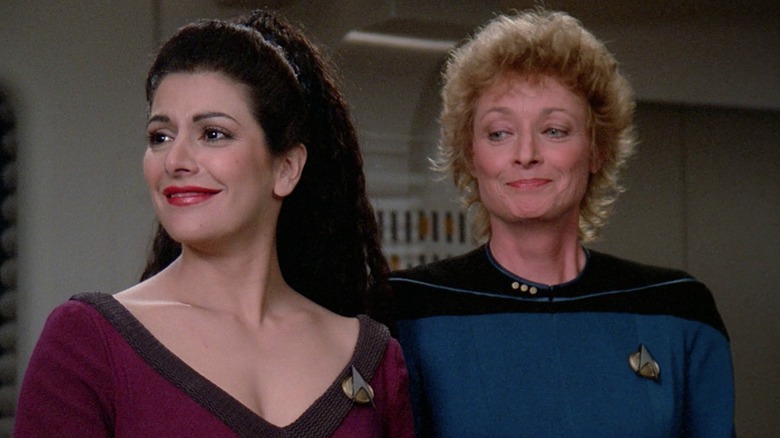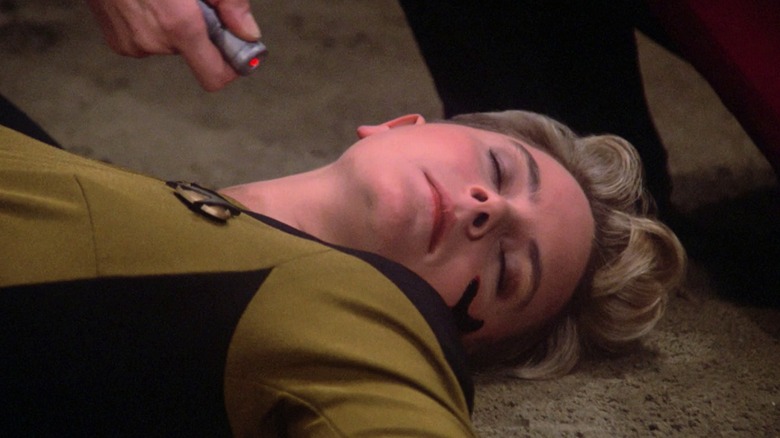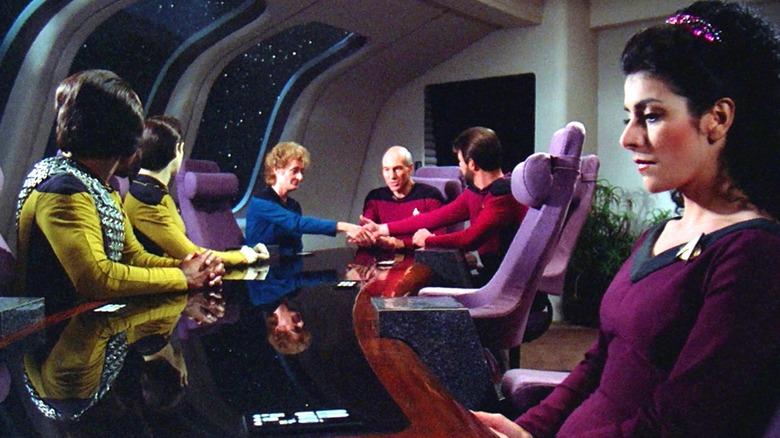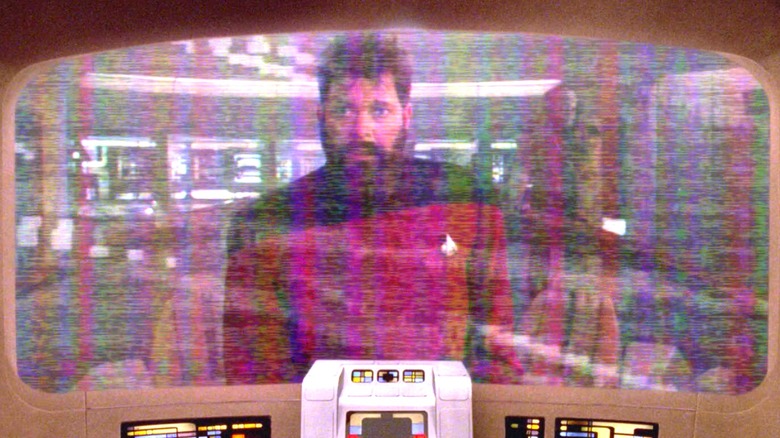5 Controversial Star Trek: The Next Generation Scenes Nobody Likes To Talk About
For all its philosophical contemplation of the human condition and nuanced exploration of sociopolitical issues, the "Star Trek" universe is not without its more bizarre moments. From problematic tropes and cheesy practical effects to poorly executed social allegories, sometimes the optimistic humanist message gets a little bogged down in questionable writing and production choices. And like every other series in the Trek canon, "Star Trek: The Next Generation" has its share of controversial scenes. A few are so cringy or even downright uncomfortable that some fans don't even like to think about them, let alone talk about them.
Sure, "The Next Generation" is loaded with epic Jean-Luc Picard moments and triumphs of holodeck LARPing. But even in one of sci-fi's best franchises, things like weak character send-offs, misguided attempts at handling complex sociopolitical issues, and inconsistent character development can occasionally creep in. Hang on to your bat'leth as we take on five controversial scenes in "The Next Generation" that no one likes to talk about.
Pulaski's final scene in Shades of Gray
The only clip show episode in "Star Trek: The Next Generation" — the finale of Season 2, "Shades of Gray" — is widely considered one of the series' worst episodes. It begins with Commander William Riker (Jonathan Frakes) and Geordi LaForge (LeVar Burton) conducting a geological survey that goes south when Riker is stung by a sentient swamp vine with nightmarish retractable blue claws. Almost immediately, Riker begins to suffer from numbness and paralysis that Dr. Pulaski (Diana Muldaur) attributes to a neurotoxic virus. To save him, Pulaski has to use giant brain needles that stimulate his darkest memories, giving viewers a Wonkaesque trip through the show's most dramatic Riker-centric nightmare fuel.
After working tirelessly to bring Riker back from the brink, a relieved Pulaski gives Riker a quick update on his condition. When the camera pans away, we never see her again — and fans of the good doctor hated it. Although Muldaur later told People that she did not enjoy her time on the series, it would still have been nice to see her character get a proper send-off rather than a weak clip show denouement.
Yar's pointless death in Skin of Evil
In terms of terrible send-offs, it doesn't get any worse than Tasha Yar's death scene in "Skin of Evil." Like Diana Muldaur, Yar actor Denise Crosby didn't have the best experience working on the series. Crosby explained to StarTrek.com, "I was just stage dressing. I chose to leave instead of just being satisfied with that." Roddenberry agreed Yar's death would add depth to the series. For a complex warrior like Yar, that should have meant some an epic emotional send-off. But instead, she was unceremoniously bodied by a sentient black puddle out of seemingly nowhere.
After a shuttle transporting Troi crash-lands on the planet Vagra II, the investigating away team encounters the literal embodiment of evil in an ambulatory slime calling itself Armus. When Yar demands Armus let her people pass to their shuttlecraft, he smacks her with an energy shock, killing her instantly. Despite a heroic effort on Crusher's part, the medical team is unable to revive her. Worse, Armus shortly reveals he did it for kicks.
Armus's sadistic attack was one of the most hated moments in "The Next Generation" — so hated that even Yar acknowledges it in the alternate timeline of "Yesterday's Enterprise." After a spacetime rift causes Guinan to encounter a reality-shifted Yar who never died, alternate Yar laments that she "died a senseless death in the other timeline."
The bros discuss Troi's reproductive rights in The Child
Science fiction loves a good mystical pregnancy and unfortunately "Star Trek" is no exception. The Season 2 opener begins with the ship's counselor becoming impregnated by a tiny purple energy orb the ship encounters while floating through space. And things only go downhill from there.
Empath that she is, Troi immediately realizes something is up and contacts Dr. Pulaski, who in turn tells Picard that Troi is pregnant. Cut to the briefing room for what may very possibly be one of sci-fi's best metaphoric representations of the controversy over women's reproductive rights — even if it is one of the most problematic scenes in "Star Trek." As a distressed and sullen-looking Troi sits alone at one end of the conference table, Picard announces — without context — that she is pregnant to the top-ranking members of his bridge crew.
Pulaski launches into an explanation about the embryo's alarmingly rapid fetal development. But the crew's reactions are equally alarming. Despite having learned Troi is expected to give birth in 36 hours, Riker demands, "Who's the father?" After Picard announces, "Our purpose here is to determine what is to be done about this," Worf, Data, and Riker — three male officers — argue over whether they should abort the fetus, study it, or abort it and then study it. Although no one seems particularly interested in Troi's feelings, she assertively interrupts them, declaring her intent to carry the baby to term.
Soren's post-conversion change-of-heart in The Outcast
"The Outcast" is another example of a problematic "Next Generation" effort at tackling social commentary, giving "Star Trek" fans one of the most depressing scenes in the franchise. The episode revolves around the Enterprise's interactions with the androgynous J'naii while assisting them with a rescue mission in a pocket of null space. Riker teams up with J'naii named Soren who secretly identifies as female — something that's forbidden in her society. And because Riker can't help but Riker, he immediately finds himself in a situationship with her.
While discussing their mutual feelings, Soren warns him, "On our world, these feelings are forbidden. Those who are discovered are shamed and ridiculed." Worse still, J'naii who are caught breaking gender norms are forced to endure conversion therapy. "Only by undergoing psychotectic therapy and having all elements of gender eliminated can they be accepted into society again," Soren reveals. After a moving speech where Soren declares she doesn't need to be cured but instead needs understanding, Soren is carted off to conversion camp. By the time Riker and Worf stage a rescue mission, she's already been reprogrammed, telling him, "I was sick. I had these terrible urges, and that's why I reached out to you." While the conclusion was sadly pretty true to what many experienced during this era, this disappointing outcome is one of many reasons the episode wasn't universally loved in the LGBTQ community.
Desperate Riker gets murderous in Parallels
One of the most controversial "Next Generation" scenes comes in "Parallels." Upon returning victorious from a bat'leth tournament, Worf is thrust back and forth between alternate realities aboard the Enterprise. It's a pretty cool concept, with the audience experiencing the trippy reality shifts from Worf's perspective. In one reality, Worf is a commanding officer, and in another, he is married to Deanna Troi. He and the crew must work to solve the mystery of what's happening to him while gaining different pieces of the puzzle found in each distinct reality. They ultimately discover a quantum gateway to infinite realities determined by individual choices.
When the fissure destabilizes, realities begin to merge, causing dozens of Enterprises to appear on the viewscreen. As they realize Worf needs to travel back through the fissure in his shuttlecraft, the Enterprise crew faces an unusual enemy: themselves. While every other Enterprise agrees to the plan to seal the fissure, one begins to attack Worf's shuttlecraft. A disheveled Riker appears on the screen declaring that they refuse to return to their world, where the Borg have taken over. When the two ships exchange fire, Riker's is destroyed. For many Trekkies, this brief encounter was one of the few moments in the franchise so disturbing it rivaled the controversial decision to terminate Tuvix in "Voyager."
